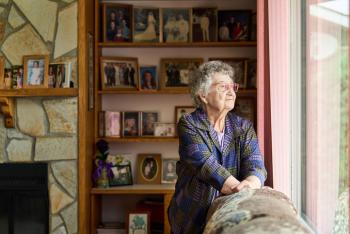Social isolation among older adults can have serious consequences, extending beyond emotional well...
Read More

Shorter days and colder temperatures can take a physical and emotional toll on many senior citizens. Fortunately, there are ways to support your older friends and family throughout the winter months. Here’s how you can help them stay safe and healthy throughout the harshest time of the year.
“One way to help your older loved ones is by addressing any potential winter safety hazards in their environment, especially in areas where snow and ice could accumulate,” said Christina Trojak, Therapy Supervisor at Inspira LIFE. “Making sure handrails are secure, sidewalks are clear and exterior lights are in working condition can help prevent slip-and-fall accidents.”
You can also minimize ice in exterior areas by getting the gutters and downspouts checked and cleared. Doing so can help prevent excess water from overflowing and freezing onto walkways or in front of doorways, increasing the possibility of an injury. As always, ask a friend or family member for assistance if you can’t safely perform these actions on your own.
“As we age, our bodies become more sensitive to cold temperatures,” said an Inspira physician, Medical Director at Inspira LIFE, who is ABIM certified in Internal Medicine, Geriatric Medicine and Hospice & Palliative Care. “This is due to a thinner layer of insulating fat under the skin and a decreased metabolic response.” These changes make it harder for older adults to maintain their internal body temperature in cold weather.
Fortunately, there are many ways to help ensure your loved ones stay warm. Check that their thermostat is set to 65°F or above and stock them up with the gear they need to stay warm. Keep extra sweaters, blankets and slippers handy inside the house, and add warm blankets to the beds. Make sure they’re ready for the winter weather with a warm coat, gloves, hats and boots with rubber soles for good traction in the snow.
“Spending less time outdoors in the winter months can affect our brain’s mood-regulating center,” said Megan James, Social Services and Behavioral Wellness Manager at Inspira LIFE. “Spending more time indoors also leads to a more sedentary lifestyle, increasing the risk of mental health issues including anxiety and depression.”
Keeping your older loved ones active and social can minimize the impact of the winter blues. Get involved at a local senior center or help them find a way to exercise at home with activities like stretching, chair yoga, exercise videos or riding a stationary bicycle.
Socializing is one of the best ways for older adults to improve their mental health, and studies show that it can reduce stress, keep the brain sharp and even decrease the risk of developing dementia. Helping your older loved ones find activities they enjoy and people they enjoy spending time with can help give them a sense of community and belonging.
If you or a loved one needs additional support to remain living independently in the community, Inspira LIFE may be a fit for you. To qualify for services at Inspira LIFE, an individual must be over the age of 55; live in Cumberland, Gloucester, or Salem County; meet a nursing facility level of care; and be safe in their home at the time of enrollment. To learn more about Inspira LIFE, visit www.InspiraLIFE.org.
Inspira Health is a high reliability organization (HRO), which means safety is the top priority for patients and staff. To make an appointment, call 1-800-INSPIRA.

Social isolation among older adults can have serious consequences, extending beyond emotional well...
Read More
Inspira welcomes Dr. Richard G. Stefanacci, DO, MGH, MBA, AGSF, CMD as our new Medical Director of...
Read More
Winter can bring feelings of isolation for older adults, but staying socially active can help combat...
Read More
The material set forth in this site in no way seeks to diagnose or treat illness or to serve as a substitute for professional medical care. Please speak with your health care provider if you have a health concern or if you are considering adopting any exercise program or dietary guidelines. For permission to reprint any portion of this website or to be removed from a notification list, please contact us at (856) 537-6772